Yogyakarta, September 13, 2025 – The Faculty of Mathematics and Natural Sciences, Universitas Gadjah Mada (FMIPA UGM), held the Fundurance MIPA 70 Ride on Saturday (13/9) to commemorate the 70th Anniversary (Dies Natalis) and the 14th Lustrum of FMIPA UGM. This cycling event has been regularly held since 2022, and this year marked its fourth consecutive implementation. ...
Tag: SDG 3: Kehidupan Sehat dan Sejahtera
Demomatika #11: Mathematical Modelling in Health and Transportation
 Yogyakarta, August 20, 2025 – The Department of Mathematics, Universitas Gadjah Mada (UGM), held the 11th edition of Demomatika, a scientific discussion themed Mathematical and Computational Modelling in Health and Transportation Systems. The event took place at Meeting Room 1, 3rd Floor, Department of Mathematics, on Wednesday (20/8), from 09:30 to 12:30 WIB. ...
Yogyakarta, August 20, 2025 – The Department of Mathematics, Universitas Gadjah Mada (UGM), held the 11th edition of Demomatika, a scientific discussion themed Mathematical and Computational Modelling in Health and Transportation Systems. The event took place at Meeting Room 1, 3rd Floor, Department of Mathematics, on Wednesday (20/8), from 09:30 to 12:30 WIB. ...
Closing of MIDSEA Summer School 2025: Participants and Lecturers Honored
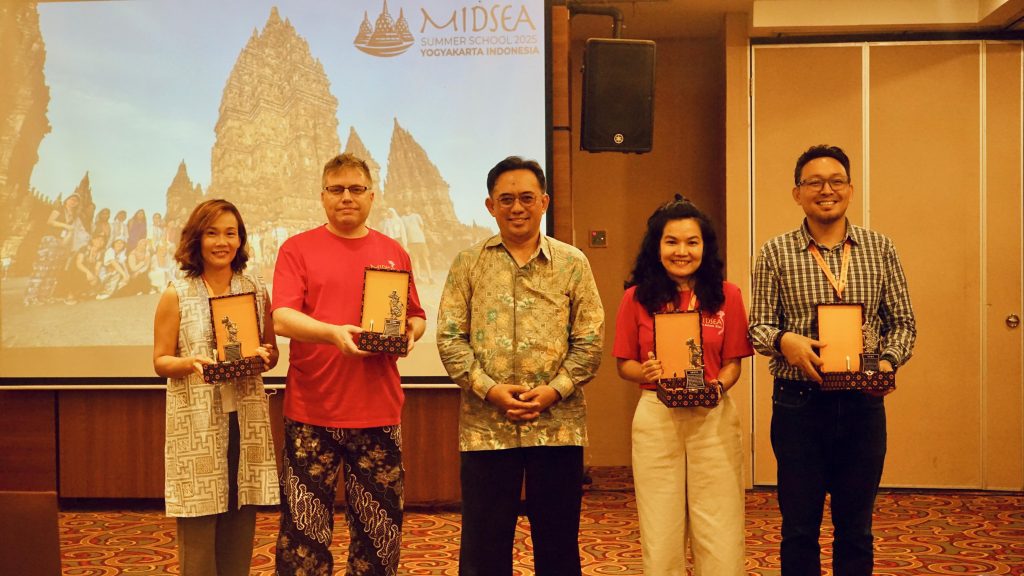 After seven full days, the MIDSEA Summer School 2025 officially concluded on Sunday, June 29, 2025, with a closing ceremony at the MICC Building, The Alana Yogyakarta Hotel and Convention Center. The closing event featured a joint reflection session with all participants and an awards presentation to participants and lecturers who contributed throughout the program. ...
After seven full days, the MIDSEA Summer School 2025 officially concluded on Sunday, June 29, 2025, with a closing ceremony at the MICC Building, The Alana Yogyakarta Hotel and Convention Center. The closing event featured a joint reflection session with all participants and an awards presentation to participants and lecturers who contributed throughout the program. ...
MIDSEA Summer School 2025 Participants Showcase Modeling Projects on Conference Day
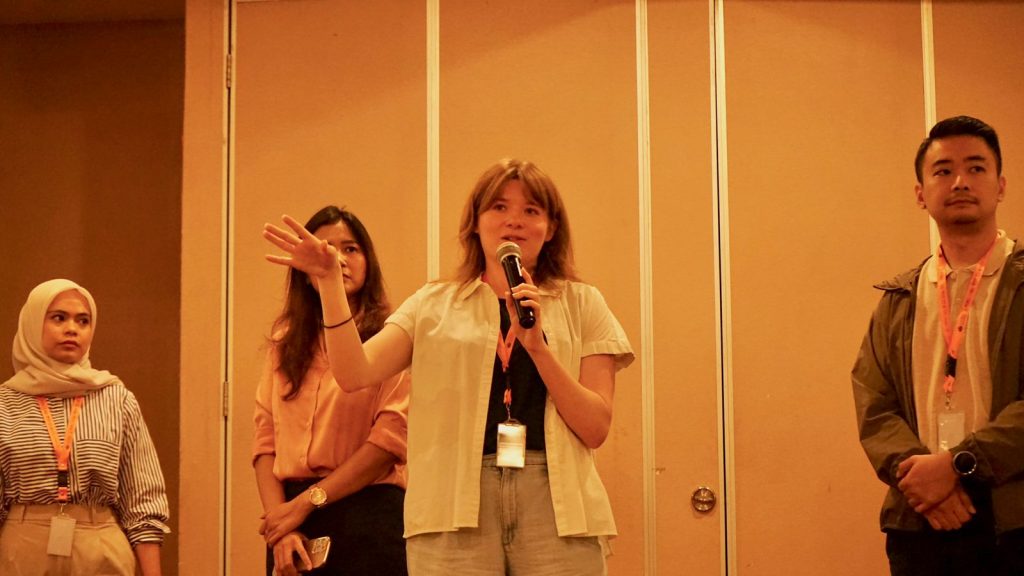 The final day of the MIDSEA Summer School 2025 kicked off with Conference Day on Sunday, June 29, 2025, at the MICC Building, The Alana Yogyakarta Hotel and Convention Center. This event served as a forum where participants from the four learning tracks presented their group projects, the culmination of five days of intensive work. The four tracks were Modelling 101, Artificial Intelligence (AI), Simulation, and Inference. ...
The final day of the MIDSEA Summer School 2025 kicked off with Conference Day on Sunday, June 29, 2025, at the MICC Building, The Alana Yogyakarta Hotel and Convention Center. This event served as a forum where participants from the four learning tracks presented their group projects, the culmination of five days of intensive work. The four tracks were Modelling 101, Artificial Intelligence (AI), Simulation, and Inference. ...
Understanding Mathematical Intuition and the Kernel Trick in Support Vector Machines (SVM)
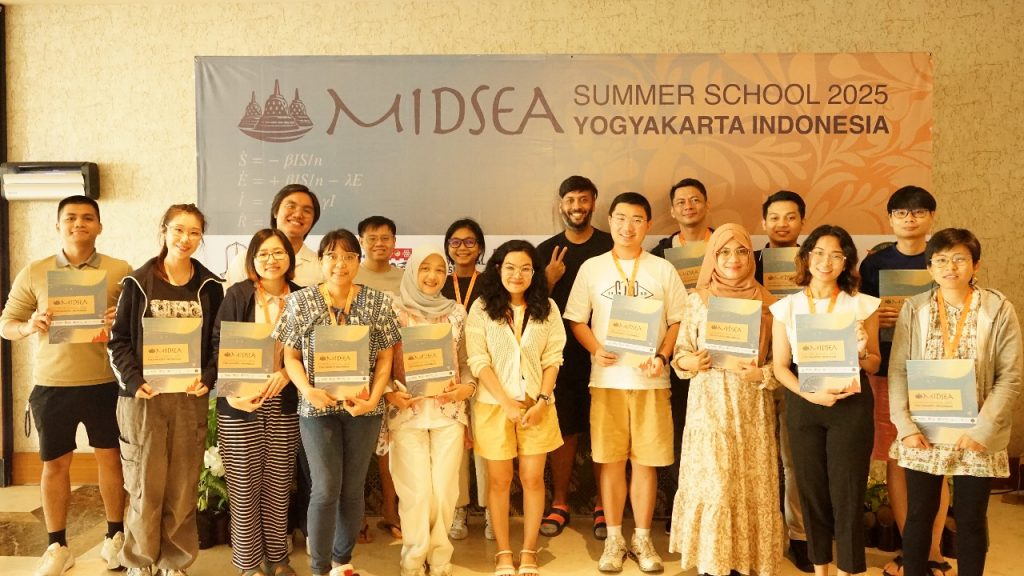 Yogyakarta, June 26, 2025 — The AI Track of the Summer School continued today with a session designed to deepen participants’ understanding of the fundamental concepts underpinning machine learning algorithms, specifically Support Vector Machines (SVM). The learning focused on the mathematical intuition and visualization of how the algorithm works to form an optimal decision boundary. ...
Yogyakarta, June 26, 2025 — The AI Track of the Summer School continued today with a session designed to deepen participants’ understanding of the fundamental concepts underpinning machine learning algorithms, specifically Support Vector Machines (SVM). The learning focused on the mathematical intuition and visualization of how the algorithm works to form an optimal decision boundary. ...
Infectious Disease Modeling: A Crucial Foundation of Modern Epidemiology
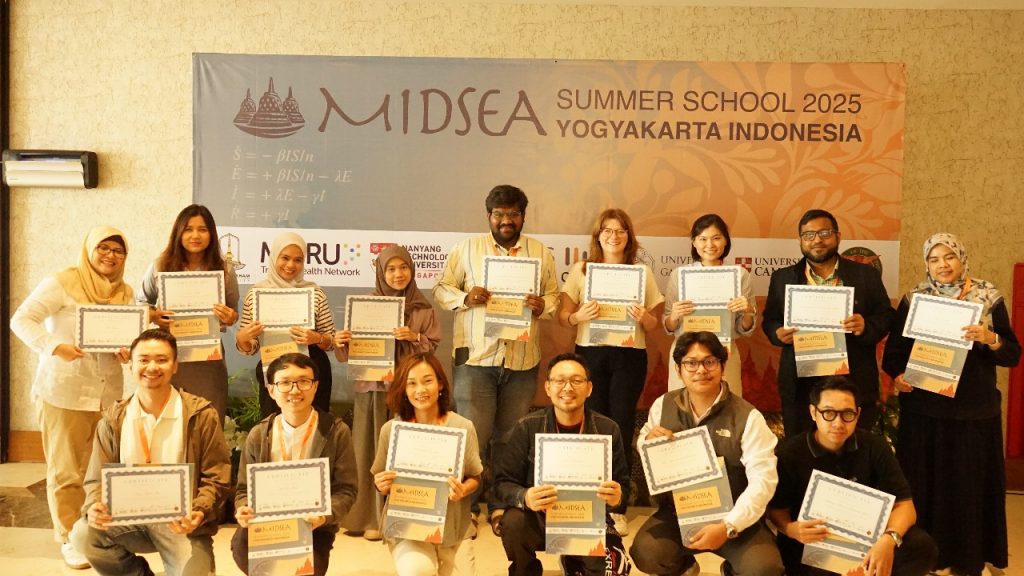 Yogyakarta, June 25, 2025 — The “Modelling 101” session, part of the MIDSEA Summer School series, was successfully held in the Arjuna Room at Alana Hotel Yogyakarta. The event saw participation from 13 individuals representing various countries, including Indonesia, the Philippines, Japan, and Thailand. Attendees came from diverse backgrounds, ranging from lecturers and researchers to WHO representatives and students with an interest in infectious disease modeling. ...
Yogyakarta, June 25, 2025 — The “Modelling 101” session, part of the MIDSEA Summer School series, was successfully held in the Arjuna Room at Alana Hotel Yogyakarta. The event saw participation from 13 individuals representing various countries, including Indonesia, the Philippines, Japan, and Thailand. Attendees came from diverse backgrounds, ranging from lecturers and researchers to WHO representatives and students with an interest in infectious disease modeling. ...
Last Day of the Simulation Track: Implementing the Material
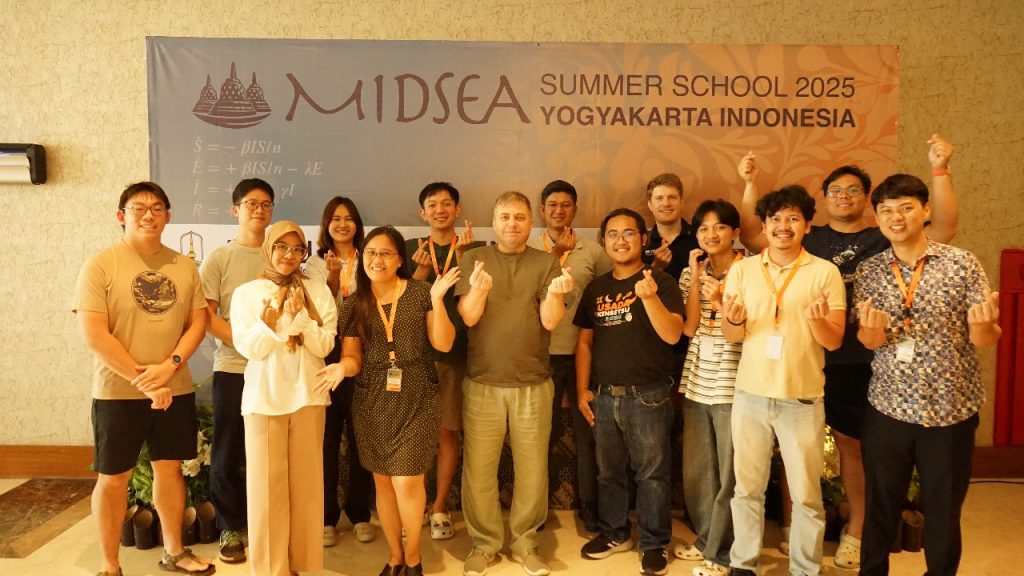 Unlike previous sessions, the final meeting of the MIDSEA Summer School 2025 Simulation Track on Saturday, June 28, 2025, in the Bima Room at the MICC Building, The Alana Yogyakarta Hotel and Convention Center, was dedicated to project work with no new material presented. Professor Alexander Richard Cook, the track’s speaker from the Saw Swee Hock School of Public Health, National University of Singapore (NUS), divided the 14 participants into three groups, assigning a different problem to each. The main focus of this session was group discussions guided by Professor Cook. ...
Unlike previous sessions, the final meeting of the MIDSEA Summer School 2025 Simulation Track on Saturday, June 28, 2025, in the Bima Room at the MICC Building, The Alana Yogyakarta Hotel and Convention Center, was dedicated to project work with no new material presented. Professor Alexander Richard Cook, the track’s speaker from the Saw Swee Hock School of Public Health, National University of Singapore (NUS), divided the 14 participants into three groups, assigning a different problem to each. The main focus of this session was group discussions guided by Professor Cook. ...
Exploring the Art of Model Selection in Epidemiology
 Yogyakarta, June 28, 2025 — Entering the fifth day of Track Inference in the MIDSEA Summer School, participants were treated to in-depth material on model selection presented by Dr. Akira Endo, Assistant Professor from the Saw Swee Hock School of Public Health. This session was one of the highlights of the day, as it directly discussed the foundations of statistical and epidemiological modeling. ...
Yogyakarta, June 28, 2025 — Entering the fifth day of Track Inference in the MIDSEA Summer School, participants were treated to in-depth material on model selection presented by Dr. Akira Endo, Assistant Professor from the Saw Swee Hock School of Public Health. This session was one of the highlights of the day, as it directly discussed the foundations of statistical and epidemiological modeling. ...
Delving into Bayesian Inference for Disease Models
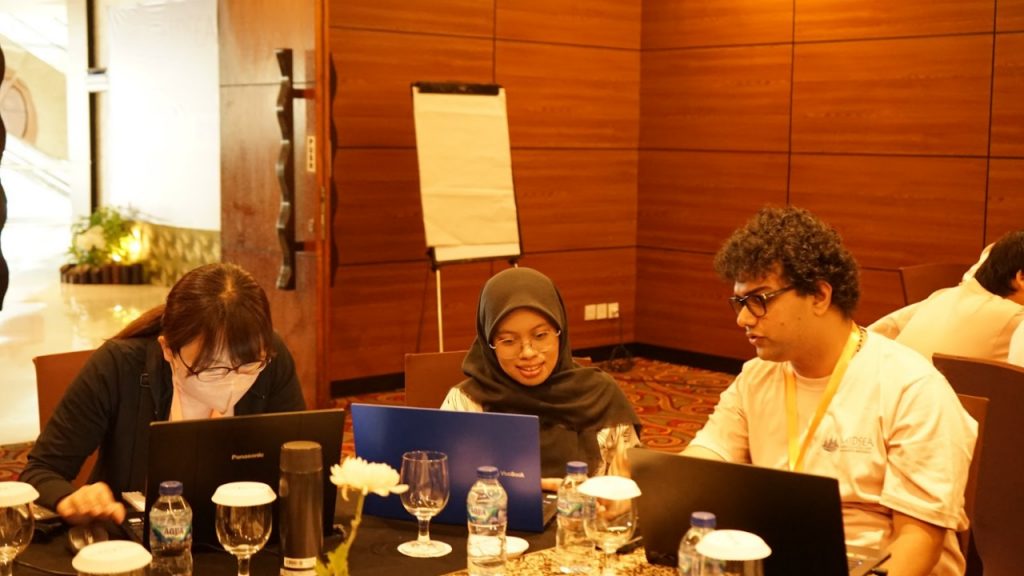 Entering the fourth day of Track Inference in the MidSEA Summer School 2025, the participants’ enthusiasm grew stronger, especially when entering one of the key sessions: Bayesian Parameter Estimation for Transmission Models. This session provided in-depth learning on how modern statistical approaches can be applied to understand and predict the spread of infectious diseases. ...
Entering the fourth day of Track Inference in the MidSEA Summer School 2025, the participants’ enthusiasm grew stronger, especially when entering one of the key sessions: Bayesian Parameter Estimation for Transmission Models. This session provided in-depth learning on how modern statistical approaches can be applied to understand and predict the spread of infectious diseases. ...
The Important Foundations of Modern Epidemiology
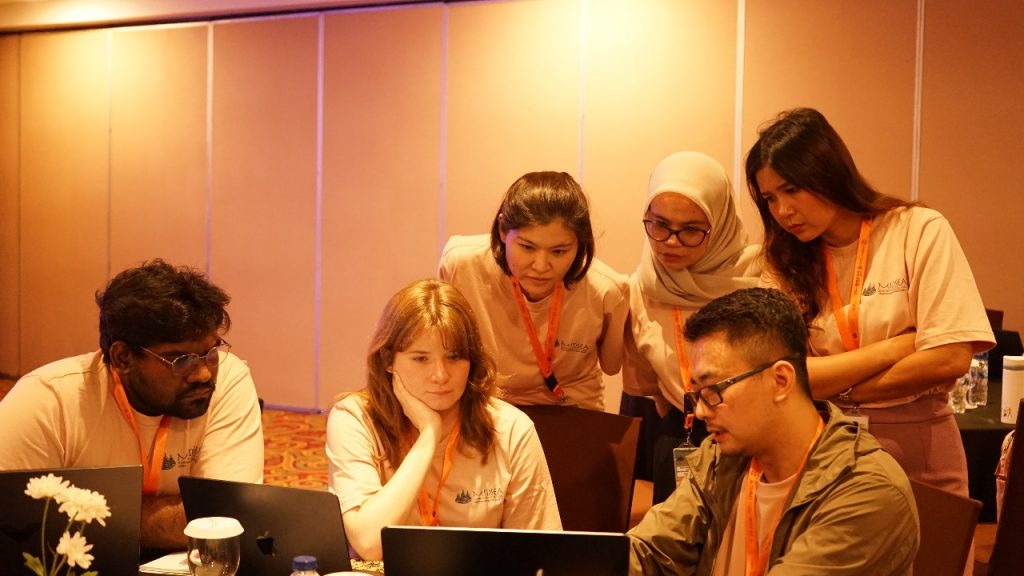 The “Modeling 101” session, part of the MIDSEA Summer School series of activities, was successfully held at the Arjuna Room, Alana Hotel Yogyakarta. The session featured three main speakers: Dr. Hannah Clapham from the Saw Swee Hock School of Public Health, Prof. Jomar Fajardo Rabajante from the University of the Philippines Los Baños, and Dr. Wirichada Pan-Ngum from the Mahidol-Oxford Tropical Medicine Research Unit (MORU). The three speakers presented complementary materials on the fundamentals of modeling in the context of infectious disease epidemiology and its application in public health policy. ...
The “Modeling 101” session, part of the MIDSEA Summer School series of activities, was successfully held at the Arjuna Room, Alana Hotel Yogyakarta. The session featured three main speakers: Dr. Hannah Clapham from the Saw Swee Hock School of Public Health, Prof. Jomar Fajardo Rabajante from the University of the Philippines Los Baños, and Dr. Wirichada Pan-Ngum from the Mahidol-Oxford Tropical Medicine Research Unit (MORU). The three speakers presented complementary materials on the fundamentals of modeling in the context of infectious disease epidemiology and its application in public health policy. ...

